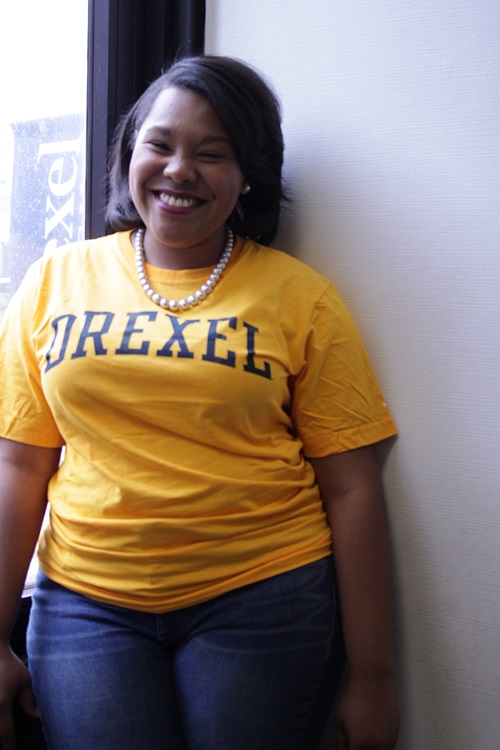
Hometown: Lake Charles, Louisiana
Undergrad: Xavier University of Louisiana
Student's next step: Tulane University School of Medicine
Can you tell me a little bit about your background before coming to Drexel?
I am from Lake Charles, Louisiana, a small city near the Texas border. I attended undergrad at Xavier University of Louisiana, a HBCU (historically black college or university) in New Orleans. I had originally planned to become a medical doctor, so I majored in biology and after graduating, I chose to further my education by getting my master’s degree at Drexel through the Interdisciplinary Health Sciences (IHS) program.
Why did you decide to come to Drexel for a master’s program before going to medical school?
I was looking for a master’s program that would enhance my future application to medical school and a program that would offer a different life experience from my life in the south. I liked that the IHS program emphasized MCAT preparation, which would allow me to continue studying for my MCAT while also taking graduate level courses. I felt like it kept me sharp and pushed me academically.
What was your first impression of Drexel and Philadelphia?
I never lived in a city as big as Philadelphia, so that was an adjustment. Once classes started and I walked around a little, it didn’t take long for me to feel comfortable by trying new restaurants and sight-seeing. Philadelphia is a beautiful city with different cultures and it has a lot of history. I especially loved the winter, because I’m from Louisiana, I had never seen snow or built a snowman. Drexel does a good job with making you feel welcomed as a student in such a large city. My adviser pushed me to get involved in different clubs, TA a few classes, and meet some great friends.
What was your favorite part of the IHS program?
The professors were the best part of the IHS program. They were very supportive, and I could tell they genuinely cared about our future. They weren’t just there to teach us and go home. They asked questions about our goals, and they helped guide us toward reaching our aspirations. They assisted in finding research positions and made sure we understood the course work. I must admit the course load was challenging, but I appreciated that because I felt like I made the right investment for my future.
What was your relationship like with the other students in the program?
Everyone in the program was incredibly friendly. We pushed each other in positive ways to excel in class and study hard for the MCAT. When we got breaks from school, we had many dinners where we exchanged our cultures through food, conversation, and love for the televisions show Scandal (thanks Shonda!). I truly made some lifelong friends while at Drexel.
What’s next for you after the IHS program?
Most students who go through the IHS program end up applying for medical school to pursue their MD/DO degrees. That was my plan when I applied, but while I was at Drexel, I realized my passion to be a medical doctor wasn’t there. I started looking at different options, and during the summer after my first year at Drexel, I got a job at my alma mater teaching biology in a prep course for high school seniors. I absolutely loved interacting with the students and teaching them weird facts about biology and it was at that point that it became clear a PhD would be a better route for me. When I came back to Drexel, I spoke to my Dean and professors about my new passion for teaching and possibly a career in research.
The support I got from my professors at Drexel was unbelievable. After hearing that I was interested in Infectious Diseases and Microbiology, they showed me what I needed to do to apply for PhD programs. They assisted me throughout the entire process, and now I’m pursuing my PhD at Tulane University School of Medicine in New Orleans in the Biomedical Sciences Program.
Where do you see yourself in ten years?
Hopefully, I will have finished my PhD within the next four or five years. I’m on the fence of whether I’d like to go into industry or academia after graduating with my PhD. If I do choose an industrial route, I would love to work on vaccines for the CDC or maybe in a health department unit in Texas working to decrease the spread of infectious diseases. I’m thinking Texas would be a good place to work because it’s close to home, and it also has Tex-Mex! I wouldn’t mind working later in academia at a historically black college or university like Xavier, since it played such a major role in my education, and I’d like to continue assisting under-served communities.
What advice would you give to someone who is considering the IHS program?
The IHS program is a great opportunity to figure out if medical/dental/doctoral school is truly for you. You aren’t placed inside a box in this program. You’re able to venture out to find your place, which will be the hardest and most rewarding decision made during your time at Drexel. Whether the IHS program sharpens your medical school application or guides you toward a hypothesis-driven career like in my situation, you will be challenged academically and mentally along the way. Just remember you will always have plenty of support and guidance for the next step in your career. Good luck, new Dragon!